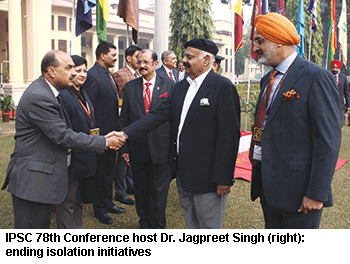 On december 2-5, principals and headmasters of over 67 legacy boarding schools, some established over 150 years ago, convened at the Punjab Public School, Nabha, a salubrious town 27 km from Patiala, for the 78th annual conference of the Indian Public Schools’ Conference (IPSC), the umbrella theme of which was ‘Positive progressive partners soaring towards excellence’. Among the blue-chip predominantly boarding schools represented were The Doon School, Dehradun; Mayo College, Ajmer; Maharani Gayatri Devi Girls, Jaipur; Daly College, Indore and Scindia Kanya Vidyalaya, Gwalior — all of them top-ranked in various categories (all girls, all boys, co-ed etc) in the EducationWorld India School Rankings 2017-18.
On december 2-5, principals and headmasters of over 67 legacy boarding schools, some established over 150 years ago, convened at the Punjab Public School, Nabha, a salubrious town 27 km from Patiala, for the 78th annual conference of the Indian Public Schools’ Conference (IPSC), the umbrella theme of which was ‘Positive progressive partners soaring towards excellence’. Among the blue-chip predominantly boarding schools represented were The Doon School, Dehradun; Mayo College, Ajmer; Maharani Gayatri Devi Girls, Jaipur; Daly College, Indore and Scindia Kanya Vidyalaya, Gwalior — all of them top-ranked in various categories (all girls, all boys, co-ed etc) in the EducationWorld India School Rankings 2017-18.
Modeled on the Public School Conference of the UK, the IPSC was constituted in 1939 by British headmasters of princely schools such as Rajkumar College, Rajkot, Daly College, Indore and Aitchison College, Lahore with the objective “to prepare students of ability for positions of service and responsibility in all walks of national life”. Since then, IPSC has grown to 80 member schools including newly-established boarding schools such as Rishi Valley School, Chittoor (estb.1926), Sarala Birla Academy, Bangalore (2004), Assam Valley, Balipara (1995), Emerald Heights, Indore (1983) and Sanskaar Valley, Bhopal (2006).
Initially promoted to school the children of British civil servants and soldiers, the country’s legacy boarding schools gradually began admitting children of privileged Indian civil servants of the Raj. But they were regarded as citadels of privilege by the leaders of the freedom movement and their survival in independent India was doubtful. Yet with some leaders of the freedom movement and a growing number of civil service bureaucrats enrolling their progeny in these vintage boarding schools which offered — and continue to offer — high-quality English language education, pastoral care, excellent sports and co-curricular facilities, they became the favourite education destinations of post-independence India’s elites and business classes.
Unsurprisingly, India’s vintage boarding schools — most of them sited in picturesque hill stations and climes far away from the country’s chaotic and polluted cities — have not only survived but flourished as islands of high-quality, English-medium private K-12 education.
However in recent years new genre international schools affiliated with international exam boards such as the Geneva-based International Baccalaureate, Cambridge Assessment International Education (formerly CIE), UK and several American boards have emerged as attractive alternatives. In response, IPSC member schools hitherto content to do their own thing in remote, isolated hill stations, are taking steps to include technology-based education, collaborations with the best foreign universities and international exchange programmes through global networks of Round Square and American Field Services (AFS). “Our new focus areas are internationalism, collaboration and leadership education. Our member schools are increasingly collaborating in areas such as theatre, Model United Nations, literary events, robotics, technology summits and by way of competing in 257 sporting disciplines,” says Dr. Jagpreet Singh, conference host, principal of Punjab Public School and executive committee member of IPSC.
The equanimity of legacy boarding schools has also been disturbed by increasing interference from state governments with their autonomy. Hitherto exempt from state government rules and regulations by virtue of being affiliated with the pan-India CISCE, CBSE and offshore exam boards, assertive state governments are beginning to impose tuition fee ceilings and compulsory teaching of local languages upon them. Thus, West Bengal has already made Bengali compulsory for all schools in the state regardless of board affiliation and Karnataka is likely to follow suit.
“IPSC has been an organisation promoting cultural and sports interactions between our member schools. But with the Central and state governments increasingly enacting legislation which impact our fees and curriculums, perhaps this is the time when we should pass on the benefit of our long collective experience of K-12 education to the Central and state governments and help them formulate policies, rules and regulations in the larger national interest,” says A.J. Singh, principal of the Top 10 ranked Pinegrove School, Solan (Himachal Pradesh) and incoming chairman of IPSC for 2018.
In short, there’s growing awareness within IPSC member schools that if they don’t get involved in shaping official policy, government policies will shape them.
Bharati Thakore (Nabha)